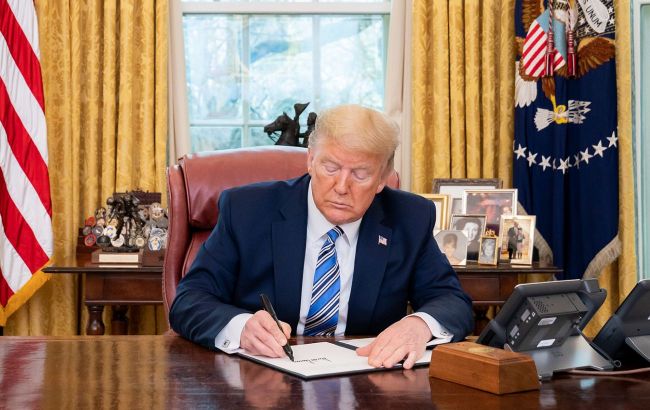Donald Trump signs his first executive orders: Details
 Donald Trump approved his first presidential executive orders (photo: flickr.com)
Donald Trump approved his first presidential executive orders (photo: flickr.com)
On his first day as US president, Donald Trump began by signing executive orders related to energy, immigration policy, and national security, and reversing several decisions made by the administration of Joe Biden. These documents do not require Congressional approval, allowing for swift implementation.
What executive orders did Donald Trump sign
A few hours after the inauguration ceremony on January 20, Donald Trump began signing his first executive orders as president.
Ahead of the inauguration, the 47th president of the US stated that he did not want to waste a single minute in fulfilling his campaign promises. He announced the release of about 100 orders and promised to wipe out dozens of destructive and radical executive orders and actions from the Biden administration with one stroke of the pen.
Trump's executive orders cover a wide range of domestic and foreign policy issues.
Energy
The president declared a state of emergency in the US energy sector.
The orders in this area announce a national energy emergency and free up domestic fossil fuel extraction. They are aimed at increasing the production of oil, and gas, and the restoration of energy projects that had been halted by the previous administration.
Through his orders, Trump intends to restore and accelerate the federal leasing program for oil and gas extraction sites, lift the ban on liquefied natural gas exports, and revoke the drilling ban, including in offshore waters and the ANWR wildlife refuge in Alaska.
Under the president's decision, the US will again withdraw from the Paris Climate Agreement (a similar decision was made by Trump during his first term), which is intended to reduce carbon dioxide emissions to combat climate change.
This will result in the cancellation of environmental protection measures and slow down the implementation of green energy projects. Restrictions on greenhouse gas emissions from vehicles will also be reviewed, and mandates for electric vehicles will be canceled.
It was unclear initially what actions the government would take as a result of the energy emergency. However, Trump’s allies speculate that this order could allow the administration to quickly approve pipelines and other infrastructure for fossil fuel extraction.
National security
Operational groups are set to be created to combat drug cartels. These cartels will be designated as foreign terrorist organizations.
This designation will enable the US to apply new legislative tools to fight these groups, including the possibility of conducting military operations against them and imposing additional economic sanctions.
Fight against illegal immigration
President Donald Trump, through an executive order, declares illegal immigration at the US-Mexico border a national emergency.
The order focuses on strengthening border control, resuming the construction of the border wall, and granting military authorities more power to maintain order at the border. Immigration officers will be given greater leeway to arrest migrants without a criminal record.
To slow down migration, stricter rules will be introduced for obtaining work permits, green cards, and visas.
Under the US president's executive order, the right to citizenship by birth will be revoked for children born in the US to parents without legal immigration status.
The refugee resettlement program in the US will also be suspended for at least four months.
Trump signed a list of executive actions on immigration, which includes designating drug cartels as foreign terrorist organizations. This could allow the use of military forces on Mexican territory.
Recognizing the cartels as foreign terrorist organizations could also lead to increased financial sanctions and legal consequences in the US for those involved.
Trump also signed an executive order declaring a state of emergency at the US-Mexico southern border, which will lead to the deployment of additional Pentagon resources and military forces to complete the construction of the border wall, among other measures. The focus remains solely on securing the southern border.
US withdrawal from the World Health Organization (WHO)
A signed document from President Trump was published on the White House website, stating that the US intends to withdraw from the WHO.
The new President also annulled a letter from former President Joe Biden to the UN Secretary-General (dated January 20, 2021) regarding the cancellation of Trump’s executive order, which initiated the process of the US withdrawal from the WHO during his first term.
Pardons for those convicted of the Capitol riot
Donald Trump has repeatedly stated that he plans to swiftly pardon individuals convicted for their involvement in the January 6, 2021, Capitol attack upon taking office. The president's team has compiled a list of individuals to be pardoned through a corresponding executive order.
It is important to note that approximately 1,500 people were convicted of crimes related to the disturbances near the Capitol building, with the vast majority of them pleading guilty.
These are nearly all those who were charged following the January 6, 2021, attack. Currently, only a few hundred individuals remain incarcerated.
Unblocking of the TikTok social network
Additionally, Trump signed an executive order aimed at suspending the enforcement of the federal ban on TikTok for 75 days. During this period, companies using the app will not face any penalties.
Speaking to reporters in the Oval Office, Trump confirmed his desire for TikTok to be sold through a joint venture with the US.
Creation of the Department of Government Efficiency
The president signed an executive order to establish the Department of Government Efficiency, led by his advisor and donor, Elon Musk. Initially, Trump had stated that the group would operate outside the government, but the order now creates the DOGE office within the White House.
According to Trump, Musk will have an office in the White House with around 20 staff members. The DOGE office in the White House is expected to help ensure the implementation of executive decisions.
For more on what is happening in the US on the day of Trump's inauguration and how the transfer of power is unfolding, you can find additional information in the article.
RBC-Ukraine also details what Ukraine can expect after Trump's inauguration and whether peace negotiations will begin.

